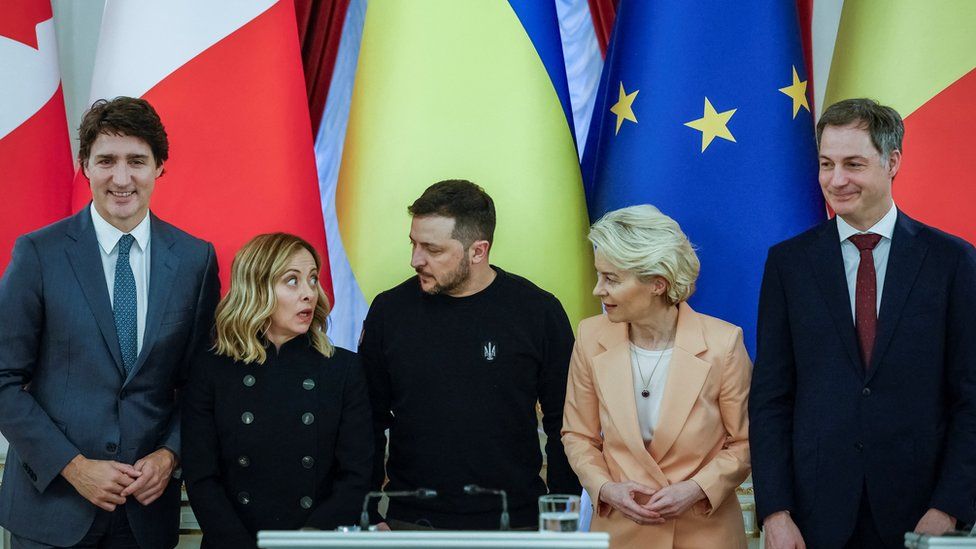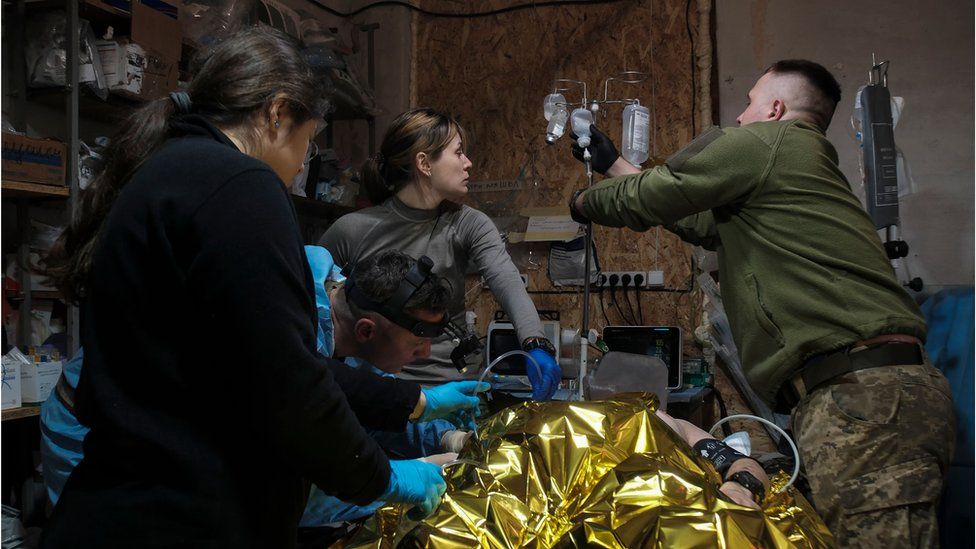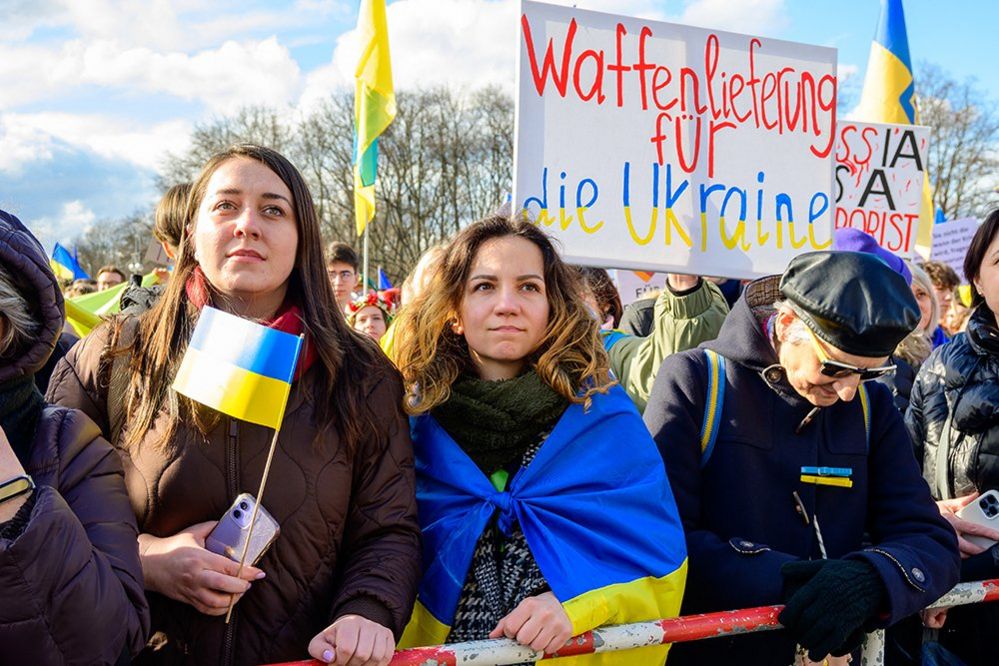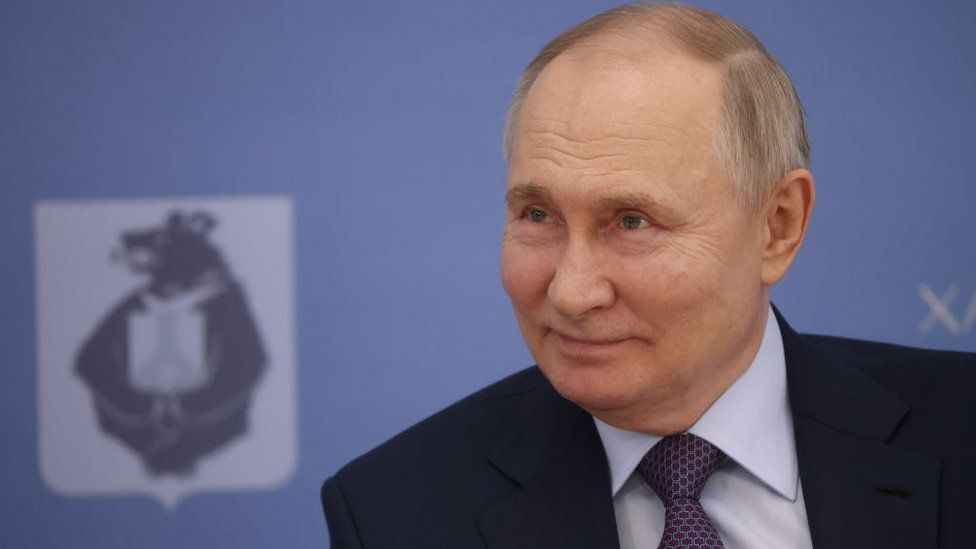With US military support stalled in Congress, European leaders are rapidly changing their thinking.
 Image source, Reuters
Image source, ReutersWhen the widow of the Russian dissident Alexei Navalny addressed the European Parliament recently, she said something striking. “If you really want to defeat Putin, you have to become an innovator,” Yulia Navalnaya told MEPs. “And you have to stop being boring.”
Being innovative and interesting may be traits not always associated with some European politicians.
But they are having to think differently, not just about how better to support Ukraine but also to increase pressure on Russia.
The shadow of a potential Donald Trump presidency hangs over the continent, raising doubts about America’s long-term backing for Ukraine.
A $60bn (£47bn) package of US military support for Ukraine is held up in the House of Representatives. And on the battlefield, Russian forces are beginning to make gains against their less well armed opponents.
Two years on from Russia’s full-scale invasion of Ukraine, European capitals have largely maintained their political backing for Kyiv.
In January the European Union agreed in January a €50bn package ($55bn; £43bn) of grants and loans to fund Ukraine’s government and public services.
But the EU failed to meet its target of sending one million shells to Ukraine by the beginning of this month.
EU diplomats are still haggling over plans for a new €5bn top-up to the European Peace Facility to buy more weapons for Kyiv. And Nato says that this year about 12 European members may still not meet the alliance’s target of spending 2% of national output on defence.

Image source, EPA
More weapons
With the diplomatic and military balance is shifting, Europe is having to think creatively about how to support Ukraine and deter future Russian aggression.
There are existing stocks of ammunition and weapons Europe could give to Ukraine.
UK Foreign Secretary David Cameron told the House of Lords this week that instead of decommissioning weapons systems at great expense once they technically pass their expiry dates, allies should give them to Ukraine.
He also said countries in Eastern Europe with “legacy Soviet ammunition” suitable for Ukrainian weapons should release those stocks immediately.
But, as throughout this war, European leaders are still agonising over what weapons to give Kyiv.
The latest row is over Germany’s Taurus missiles. These have range of about 300 miles (500km), more than the UK-supplied Storm Shadows being used by Ukraine.
Many allies believe Taurus would give Ukraine the chance to strike deep behind Russian lines.
But German Chancellor Olaf Scholz fears they could also be used against Russian cities and is resisting, fearing escalation.

Image source, AFP
There are also plans to get Ukraine desperately needed artillery shells. The Czech government agreed a $1.5bn (£1.2bn) deal this week for a consortium of 18 Nato and EU countries to buy 800,000 rounds – both 155mm and 122mm calibre – from outside the EU.
This is a significant shift for more protectionist-minded EU members, especially France. But it will not meet Ukraine’s demand for the 2.5m shells it says it needs this year.
More defence spending
Policymakers are also are mulling new ways to increase spending on defence, including a proposal for the European Investment Bank to end its ban on funding defence projects.
There are proposals for European countries to co-operate more on defence procurement, buying arms jointly from manufacturers to drive down costs. Governments are also looking to give defence firms longer-term contracts to boost production in a highly risk adverse industry.
But little will happen overnight. One British minister told me: “One forgets that Dunkirk to D-Day was four years. It takes a long time to generate the mass to go from defence to offence.”
More military support for Ukraine
Estonia wants all Nato countries to commit – as it has – to give Ukraine at least 0.25% of their output in military support.
This would raise about 120bn euros per year. Although some allies are sympathetic, this idea has yet to win widespread backing.
Some Europe policymakers are also drawing up plans for a form of updated “lend-lease” arrangement to loan weapons to Ukraine, just as the allies did for the USSR during WWII. But these ideas are at an early stage.
Russian assets
Much thought is going into how best to exploit the roughly 300bn euros of frozen Russian assets held in Western financial institutions.
Giving the money outright to Ukraine might be illegal and put European assets at risk in other jurisdictions.
But the EU is looking at a plan to use the profits to fund military support for Ukraine. And the UK is looking at a separate proposal to use the assets as collateral for fast-track reparations for Ukraine.
The aim is not just to raise cash for Ukraine but also level a strategic blow against Russia, hitting its economy hard.

Image source, Getty Images
So some European policymakers are thinking laterally. But tensions remain.
Many Eastern European countries are committing more military resource than their Western counterparts. Loose-lipped German officers are upsetting allies by revealing military secrets.
And President Emmanuel Macron of France has ruffled feathers by suggesting the West should consider putting military boots on the ground in Ukraine, thought by many analysts to be an unnecessary row over an implausible option.
Perhaps the biggest disagreement within European capitals is about the long-term challenge from Russia.
A recent poll from the European Council on Foreign Relations think tank suggested while most Europeans support Ukraine, only 1 in 10 think it can win an outright victory.
Some analysts say this is because European governments have not understood the broader challenge from Russia.
“There is no evidence that the highest political level has understood the scale of the threat or tried to explain it to the public,” says Keir Giles, senior consulting fellow at Chatham House, a British think tank.
“If action comes too late to avoid disaster, it will have been because of criminal complacency.”
So will Europe rise to the challenge? Maybe there was one small hint of change this week.
France has long been criticised for not giving Ukraine enough military support. But President Macron – who once said Russia should not be humiliated – was in bullish form.
“We are surely approaching a moment for Europe in which it will be necessary not to be cowards,” he said.